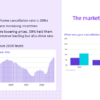November 2023 Philadelphia Mastermind Group Key Take Aways!
Paul’s views are his own and not the views of the Federal Reserve. (Paul Flora – Federal Reserve Bank of Philadelphia)
Data doesn’t always offer a signal until a year later, but in the Great Recession they started to see signals in April of 2008, but it often becomes clear before the data comes in. (Paul Flora – Federal Reserve Bank of Philadelphia)
There are no particularly strong signs or a strong reason for a slowdown. Recession signals are scarce and fears have waned. But uncertainty is the norm in a slow-growth economy. (Paul Flora – Federal Reserve Bank of Philadelphia)
The weakest aspect of the economy may be the office market in some of the larger cities, but even those are showing some signs of improvement. Class A in New York may be improving. (Paul Flora – Federal Reserve Bank of Philadelphia)
There will be losses along the way, but everything that can be done is being done, so the economic pains may be smoothed out over the coming years. (Paul Flora – Federal Reserve Bank of Philadelphia)
Unemployment rates have returned to historically low levels before the pandemic. Part of the nervousness has been that it’s been relatively flat. (Paul Flora – Federal Reserve Bank of Philadelphia)
Philadelphia has surpassed its prior peak in payroll jobs growth by 118,000. (Paul Flora – Federal Reserve Bank of Philadelphia)
Consumers have been upset with inflation and rising prices, but inflation has been coming down for over a year. Expected to continue falling. (Paul Flora – Federal Reserve Bank of Philadelphia)
Energy prices can fluctuate and bring inflation back up, and there could be other unexpected issues that arise that can’t be predicted. (Paul Flora – Federal Reserve Bank of Philadelphia)
Consumers remain unhappy that prices haven’t fallen. But they don’t have to fall, they have to start rising at a slower rate. Falling prices would be deflation, which happened during the Depression and is not desirable. (Paul Flora – Federal Reserve Bank of Philadelphia)
Today’s per gallon fuel price is the same as the late 1970s, but consumers don’t like the fluctuations in gas prices. (Paul Flora – Federal Reserve Bank of Philadelphia)
During the first energy crisis people changed their behavior / lifestyle to conserve fuel, but current lifestyles are dependent on larger vehicles and more driving. (Paul Flora – Federal Reserve Bank of Philadelphia)
New vehicle prices have been relatively flat over the past 20 years. Used car prices were up and are coming down again. (Paul Flora – Federal Reserve Bank of Philadelphia)
Prices for many types of at home foods are below inflation rates of other items, despite people’s perception. Eggs have fallen well below inflation after the avian flu outbreak ended, fresh fruits and vegetables are higher than inflation, but may be due in part to the popularity of organic. Beef and veal have risen more than poultry and fish, while coffee and milk have remained below other items. Eating unprocessed foods (not pre-made) at home is a way to save money. (Paul Flora – Federal Reserve Bank of Philadelphia)
Food away from home has risen substantially and has really opened up since the great recession. (Paul Flora – Federal Reserve Bank of Philadelphia)
Housing prices have risen significantly and represent a large portion of the overall index. Household furnishings are lower, in part because items are coming from China. (Paul Flora – Federal Reserve Bank of Philadelphia)
Long term college tuition and medical care have both risen significantly. Rising college rates have decreased the utility of college students working over the summers and during school to help pay for college. (Paul Flora – Federal Reserve Bank of Philadelphia)
Alcohol away from home has risen significantly, while alcohol at home is under the inflation rates of other items. (Paul Flora – Federal Reserve Bank of Philadelphia)
The misery index (unemployment rate + inflation rate) is better than all the 70s and 80s. (Paul Flora – Federal Reserve Bank of Philadelphia)
Consumer confidence is shaken though not despairing. Media hype and misinformation may be to blame. (Paul Flora – Federal Reserve Bank of Philadelphia)
Professional forecasters have become less bearish as of Q3 2023. Not seeing signs that the economy is falling off a cliff. (Paul Flora – Federal Reserve Bank of Philadelphia)
Bankruptcies and delinquencies are not at concerning levels. (Paul Flora – Federal Reserve Bank of Philadelphia)
Fed has held short rates with the goal being to get through this period without triggering a recession, so they don’t want to push interest rates further than they have to. (Paul Flora – Federal Reserve Bank of Philadelphia)
Hearing from car dealer groups that the interest rate really hasn’t slowed things down. Higher interest rates will reduce demand, but so far haven’t done so enough to create backups on the lots. Some EVs have backed up, but they’re more expensive. (Paul Flora – Federal Reserve Bank of Philadelphia)
Through the pandemic, people were buying housing with cash, so interest rates weren’t an impact. (Paul Flora – Federal Reserve Bank of Philadelphia)
Because of the Affordable Care Act, people are able to take more gig work, which adds fluidity to the market. This is a possible reason unemployment has remained low. Haven’t had a real recession since the ACA was put in place, which has a substantive impact on people’s relationship to the labor market. (Paul Flora – Federal Reserve Bank of Philadelphia)
Cost of education no longer makes sense for everyone and there is an uptick of people learning trades and going to junior college. (Craig Bryson – Pennoni Associates)
A few colleges that were competing with Ivy League schools slashed their tuition and decreased their endowments for low income students. There is a risk of a snob appeal effect. Fixing hiring education may require a cultural shift. (Paul Flora – Federal Reserve Bank of Philadelphia)
Elections create uncertainty and caution, which is expected to increase in the coming year. (Paul Flora – Federal Reserve Bank of Philadelphia)
There isn’t a sense that prices would go down during the election. Worried more about what other factors around the world may do. (Paul Flora – Federal Reserve Bank of Philadelphia)
Latest development is in the multi-family space. Among 4 and 5 star rentals, vacancy is entering double digits. Lots of new units delivered recently in that class, mostly in the city. (Brenda Nguyen – CoStar Group)
There are still another 22K units being developed, much of which is in the 4 and 5 star category. Anticipating rent growth to slow and for there to be more vacancies. (Brenda Nguyen – CoStar Group)
Property owners are focusing on renter retention. (Brenda Nguyen – CoStar Group)
Construction starts have slowed down. (Brenda Nguyen – CoStar Group)
Things have been quiet and interest rates make for a difficult market. (Christian Dalzell – Counter Management)
Residential market has been hit by interest rates. (Jerry Roller – JKRP Architects)
In the residential market, things either need to get re-priced or interest rates need to come back down. (Jerry Roller – JKRP Architects)
Lack of rent growth makes it difficult for things expected to be delivered 2-3 years down the road. (Jerry Roller – JKRP Architects)
Retail market seems surprisingly steady. (Jerry Roller – JKRP Architects)
Entertainment market has revived from the pandemic. Both renovation and new construction. (Jerry Roller – JKRP Architects)
Starting to see a strong public sector. Public money is being pumped into projects (Amtrak, PennDOT, SEPTA, etc) and there aren’t enough firms to do the work. (Craig Bryson – Pennoni Associates)
Retail is steady, residential and commercial are down, life sciences is a bit oversaturated. (Craig Bryson – Pennoni Associates)
Sharswood neighborhood is now impossible to develop with a 2-story height limit in the zoning code. (Dennis Carlisle – OCF Realty)
Strawberry Mansion is now adding a ban on roof decks to an already restrictive overlay. (Dennis Carlisle – OCF Realty)
Wissahickon neighborhood is now completely locked into zero demolitions allowed for a year. (Dennis Carlisle – OCF Realty)
Overbrook has banned supermarkets, which was motivated by wanting to ban smoke shops. Even though they could have extended the tobacco sales ban close to schools. (Dennis Carlisle – OCF Realty)
There are 3 big historic districts coming which will add more layers to development – Washington Square West, Spruce Hill and Wissahickon. The intention is to curtail development. (Dennis Carlisle – OCF Realty)
The good news is that commercial leasing is still very active and getting a lot of new inventory. (Dennis Carlisle – OCF Realty)
In 2025 the Trump individual tax cuts expire. (Wendi Kotzen – Ballard Spahr)
Have signed a few multi-family leases, but it’s been overall really quiet. (Christina Lutz – Counter Management)
When looking at the order count this year to last year, they are down about 30-40% nationally. Hoping things pick up next year. (Annemarie Caruso – First American Title Insurance Company – Philadelphia)
Vacancy rate is around 14-15% right now, and pre-pandemic it was around 9.5-10%. Not great, but not awful. (Matt Frederick – PernaFrederick Commercial Real Estate)
Will find out in the next few years what the impact of the pandemic really is. (Matt Frederick – PernaFrederick Commercial Real Estate)
Rates are holding and they’re busy with expansions. (Matt Frederick – PernaFrederick Commercial Real Estate)
Some spaces are being converted to residential, which is helping by taking some supply out of the equation. (Matt Frederick – PernaFrederick Commercial Real Estate)
There has been an uptick in activity the last couple of months. Summer was rough, but Sept-Nov has seen more office deals in the market. (Joseph Viturello – PernaFrederick Commercial Real Estate)
University City is one of the hottest markets in the country. (Joseph Viturello – PernaFrederick Commercial Real Estate)
Seeing a new product in the office market that differs from the typical office towers, such as residential buildings with ground floor office spaces. (Joseph Viturello – PernaFrederick Commercial Real Estate)
Some buildings downtown are going back to lenders, but for the most part leases have continued and rates have stayed and it’s just about getting more concessions now. (Joseph Viturello – PernaFrederick Commercial Real Estate)
Target just pulled out of a deal at 37th and Chestnut, but not sure what caused them to pull out. (Joseph Viturello – PernaFrederick Commercial Real Estate)
Crime has been an issue affecting some businesses and potential deals. (Joseph Viturello – PernaFrederick Commercial Real Estate)
Many concessions are being tacked onto the backend with landlords trying to have some income coming in. (Matt Frederick – PernaFrederick Commercial Real Estate, Joseph Viturello – PernaFrederick Commercial Real Estate)
Optimistic for 2024 and 2025 to be their best year with a mix of government and private development. (Jim Karmolinski – Kelly Maiello Architects)
Their biggest obstacle is finding new talent. (Jim Karmolinski – Kelly Maiello Architects)
Insurance carrier market has become tricky and picky. Carriers are asking a lot of questions about details. (Brian Gilberg – Odell Studner Group)
There have been a lot of claims regarding charging stations, which causes an increase to insurance. One big issue is the water used to put out the fire destroys some of the wood frame. Car fires require orders of magnitude more water and are prone to re-ignite. (Brian Gilberg – Odell Studner Group, Dori Bova – Kelly Maiello Architects)
Rates are going up in general. Insurance rates on insurance companies are going up. (Brian Gilberg – Odell Studner Group)
Still seeing a slowdown and a hold waiting for financial markets to settle. (Bart Mellits – Ballard Spahr)
Industrial market has been booming but the growth in that area has slowed. (Bart Mellits – Ballard Spahr)
They work in the multi-family space as an owner-operator with 18K units. Mostly looking at the acquisition side, and prices have come down significantly. (Tim Hoyt – Gold Oller)
It’s difficult to raise equity and they mostly use institutional investors and private equity groups. (Tim Hoyt – Gold Oller)
Rents are flat and new supply is popping up everywhere, making for a challenging market. (Tim Hoyt – Gold Oller)






Recent Comments